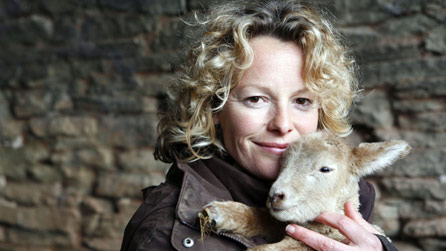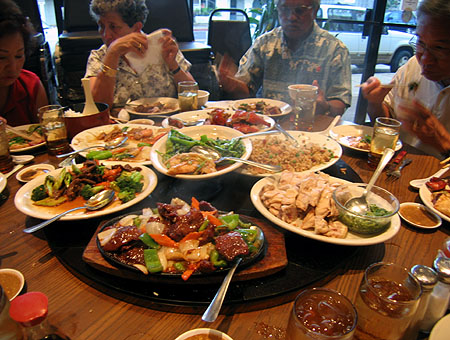In November 1996, over 400 fell ill and 21 were killed in Scotland by E. coli O157:H7 found in deli meats produced by family butchers John Barr & Son. The Butcher of Scotland, who had been in business for 28 years and was previously awarded the title of Scottish Butcher of the Year, was using the same knives to handle raw and cooked meat.
In a 1997 inquiry, Prof. Hugh Pennington recommended, among other things, the physical separation, within premises and butcher shops, of raw and .jpg) cooked meat products using separate counters, equipment and staff.
cooked meat products using separate counters, equipment and staff.
Five-year-old Mason Jones (right) died a painful and unnecessary death on Oct. 4, 2005, from E. coli O157 as part of an outbreak which sickened 157 — primarily schoolchildren — in south Wales.?
In a 2009 inquiry, Prof. Pennington concluded that serious failings at every step in the food chain allowed butcher William Tudor to start the 2005 E. coli O157 outbreak, and that while the responsibility for the outbreak, “falls squarely on the shoulders of Tudor,” there was no shortage of errors, including:??
• local health types did not sufficiently assess or monitor John Tudor & Son’s food safety management or HACCP plan;??
• the abattoir was allowed to continue slaughtering despite longstanding and repetitive failures, in breach of legislative requirements and without significant improvements; and,?
• the procurement process was “seriously flawed in relation to food safety.”??
Pennington also heard that butcher Tudor:
• encouraged staff suffering from stomach bugs and diarrhea to continue working;
• knew of cross-contamination between raw and cooked meats, but did nothing to prevent it;
• used the same packing in which raw meat had been delivered to subsequently store cooked product;
• operated a processing facility that contained a filthy meat slicer, cluttered and dirty chopping areas, and meat more than two years out of date piled in a freezer;
• a cleaning schedule at the factory that one expert called "a joke;"
• falsified crucial health and safety documents and lied about receiving hygiene awards; and,
• supplied schools with meat that was green, smelly and undercooked.
Prof Pennington said he was disappointed that the recommendations he made more than 10 years ago, following the E. coli O157 outbreak in Wishaw, Scotland, which killed 21 people had failed to prevent the South Wales Valleys outbreak.
Today, the U.K. Food Standards Authority issued guidance to clarify the steps that food businesses need to take to control the risk of contamination from the food bug E. coli O157.
Serious outbreaks of E. coli in Scotland in 1996 and Wales in 2005 resulted in serious illness in some individuals and, in a few cases, death. These outbreaks were attributed to cross-contamination arising from the poor handling of food.
Seriously, I don’t know who writes this stuff; 23 died in the Scotland outbreak.
Yes, the butchers in both cases made terrible food handling decisions that led to illness and death. But people are going to do dumb, or criminal things with food, which means the overall microbial load must be minimized as food moves from farm-to-fork.
FSA has nothing to say on this.
It is also expected that the guidance will be used by local authority food safety officers when inspecting businesses in their area.
Those inspectors didn’t catch anything at either John Tudor & Sons, or John Barr, the butchers of Wales and Scotland, respectively.
In 1999 Prof Pennington said,
“The prospect of another Mr Barr type situation is still quite real because everybody I talk to in meat inspection and environmental health tells me there .jpg) are people who are still not doing the right thing.”
are people who are still not doing the right thing.”
So almost 15 years after the Scotland E. coli outbreak, FSA says some of the key measures highlighted in the guidance to control E. coli are:
* identification of separate work areas, surfaces and equipment for raw and ready-to-eat food;
* use of separate complex equipment, such as vacuum-packing machines, slicers, and mincers for raw and ready-to-eat food; and,
* handwashing should be carried out using a recognised technique and anti-bacterial gels must not be used instead of thorough handwashing.
Verifying cooking procedures with tip-sensitive digital thermometers rather than relying on the terrible advice of “until the juices run clear” or “piping hot” would help. But don’t expect FSA to say anything. Maybe in 15 years.
 through contact with infected feces and other body fluids and tissues.
through contact with infected feces and other body fluids and tissues.
 brought before magistrates in Neath.
brought before magistrates in Neath.(1).jpg) sentenced to eight months in prison.??
sentenced to eight months in prison.??(1).jpg) has let the public down badly. They have a duty to legislate to make sure that this sort of thing is in place.”
has let the public down badly. They have a duty to legislate to make sure that this sort of thing is in place.”.jpg) displayed at business premises.
displayed at business premises..png) currently have a written procedure for food hygiene. Whilst the business premises could be spotless, without this written supporting document they could not be scored above a one-star rating. It is important to note that those premises with low ratings are most likely to be in the process of improving."
currently have a written procedure for food hygiene. Whilst the business premises could be spotless, without this written supporting document they could not be scored above a one-star rating. It is important to note that those premises with low ratings are most likely to be in the process of improving.".jpg) cooked meat products using separate counters, equipment and staff.
cooked meat products using separate counters, equipment and staff..jpg) nursing, confirmed 42 per cent of doctors and consultants had failed to ensure their hands were cleaned properly.
nursing, confirmed 42 per cent of doctors and consultants had failed to ensure their hands were cleaned properly. sentenced to eight months in prison by Mold Crown Court.
sentenced to eight months in prison by Mold Crown Court. surroundings with an attentive and knowledgeable staff to make your meal with us unforgettable’, was closed immediately and deep-cleaned following the inspection last July.
surroundings with an attentive and knowledgeable staff to make your meal with us unforgettable’, was closed immediately and deep-cleaned following the inspection last July..jpg) which meant Bridgend butcher William Tudor – the man responsible for the 2005 outbreak during which more than 150 people were infected with potentially deadly E. coli O157 – escaped a manslaughter charge.
which meant Bridgend butcher William Tudor – the man responsible for the 2005 outbreak during which more than 150 people were infected with potentially deadly E. coli O157 – escaped a manslaughter charge..jpg) About 160 people became ill in the 2005 outbreak – the UK’s second largest.
About 160 people became ill in the 2005 outbreak – the UK’s second largest.